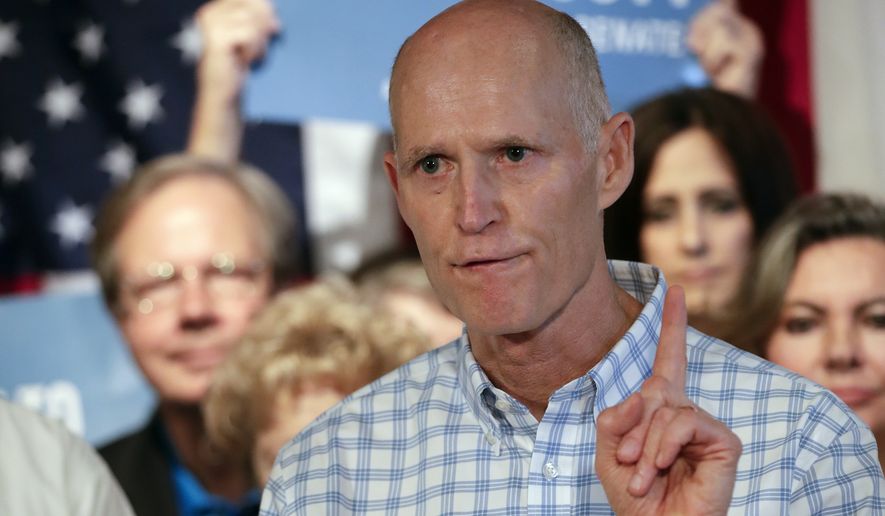Florida voters were handed another issue Monday for next month’s gubernatorial contest as the state Supreme Court ruled the next governor — not Rick Scott, the term-limited incumbent — will pick three new justices in 2019.
Long a liberal bastion in a purple state, Florida’s Supreme Court currently has a 4-3 liberal majority.
Three members of that majority — Barbara Pariente, Fred Lewis and Peggy Quince — must retire at midnight Jan. 7, the moment Mr. Scott, who is term-limited, ends his tenure.
Mr. Scott, who is currently seeking to unseat incumbent Democratic Sen. Bill Nelson in a tightly contested election, had tried to set in motion the state machinery that would have given him a shot at naming three replacements.
That means either Ron DeSantis, a former Republican congressman running with the strong endorsement of President Trump, or Andrew Gillum, the left-wing mayor of Tallahassee, will determine if, going forward, the Florida Supreme Court maintains its liberal bent. The race between Mr. Gillum and Mr. DeSantis is rated as a toss-up.
Although Mr. Scott had modified his stance and said he would make nominations in consultation with whoever wins the gubernatorial race, the state’s justices said they would hear oral arguments on Nov. 8 — two days after election day — over when Florida’s Judicial Nominating Committee can certify nominees for the governor’s consideration.
The ruling was a major rebuke to Mr. Scott who had hoped to modify or break the court’s longstanding liberal majority. The Florida Supreme Court’s two rulings in 2000 designed to keep alive Al Gore’s presidential bid were struck down by the U.S. Supreme Court by 9-0 and 7-2 votes, respectively.
State law requires justices to retire when they reach the age of 70 or, should they turn 70 while on the bench, although they may finish their six-year term if they reach the age of 70 more than halfway through their term.
Mr. Scott had asked the JNC to begin interviewing possible candidates earlier, but this decision effectively ends his ability to influence the decisions.
The leftist groups League of Women Voters and Common Cause had brought the suit against Mr. Scott’s actions that the court ruled in favor of Monday.
John Mills, attorney for the plaintiffs, noted that now, “the people will have a very important say in this matter.
“While the issue of when the JNC may make its nominations is yet to be resolved, one thing is clear now – there is no reason for the JNC to rush through the nominating process as it has been doing,” Mr. Mills said. “It is now clear that the artificial deadline of applications a month before the election created an unfair chilling effect on many potential applicants, especially those in private practice.”
The candidates’ responses reflected the difference Mr. Mills went on to highlight, namely that Mr. Gillum will be expected to “appoint diverse, qualified judges who represent the breadth and depth of people in this state,” while Mr. DeSantis will favor “constitutional conservatives” who he believes won’t “legislate from the bench.”
“I am pleased the Florida Supreme Court has brought closure to this important issue finding,” Mr. Gillum said in a statement issued by the campaign. “As we have consistently stated, that the next Governor of Florida will appoint the next three Supreme Court justices.”
But the DeSantis campaign blasted the ruling as another example of Florida’s Supreme Court Justices using the law as a political tool.
“Today’s decision makes November’s election even more critical for the future of our state,” campaign spokesman Steve Lawson, the campaign’s communications director. “If Andrew Gillum is elected, out-of-state radical groups would pressure him to appoint activist judges who would legislate from the bench to fit the own ideology. The consequences of this would be felt for generations, and it would be dangerous to every person in our state.”
Mr. Gillum said he takes the responsibility of appointing justices “extremely seriously,” and that if elected “one of my top priorities will be to restore integrity to the judicial nominating process.”
Should Mr. DeSantis win, Floridians can expect genuinely impartial justices, according to Mr. Lawson.
“Ron DeSantis will appoint justices to the Supreme Court who are fair, who will uphold the Constitution, and who will follow the law as it is written,” he said.
• James Varney can be reached at jvarney@washingtontimes.com.




Please read our comment policy before commenting.